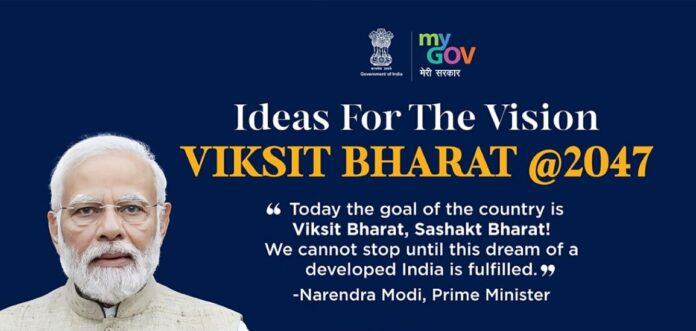The ‘Viksit Bharat @2047: Voice of Youth’ program at Delhi University (DU) wants students to think about India’s future by 2047. It hopes to get young people to share ideas for a better India. Since its launch, the Viksit Bharat drive has garnered attention across DU campuses, sparking discussions among students and faculty members.
Table of Contents
Student Feelings:
Some students like it, but others are unsure. Monika Yadav enjoys sharing ideas, but Aditi Tyagi has concerns. Students like Rahul Sharma feel it’s hard to balance with studies. Moreover, students like Priya Mehra appreciate the opportunity to take part, while others, like Akash Verma, want more than rewards. It’s clear that students have varied opinions about the program’s impact and effectiveness.
Political Influence Talks:
Some teachers think it’s more about politics than learning. Naveen Gaur says it’s common in colleges. Rahul Singh thinks it’s about politics. People worry it could affect what students think. Critics of the program raise concerns about its potential political agenda and its impact on shaping students’ perspectives. Addressing these concerns is crucial for maintaining the program’s integrity and ensuring that it serves its intended purpose of fostering constructive dialogue among students.
1269th DU EXECUTIVE COUNCIL MEET : WHAT HAPPENED?
Student Participation and Rewards:
Students join to get extra attendance, but some think it’s about numbers. Priya Mehra likes joining, but Akash Verma wants more than rewards. The program’s use of incentives to encourage participation has garnered mixed reactions among students. While some appreciate the opportunity to earn rewards. Others question the program’s focus on quantity over quality of engagement. Balancing the use of rewards with fostering genuine interest and involvement among students is essential for the program’s success.
Impact on Academic Environment:
Teachers talk about it. Some think it’s good for talking, but others worry about studies. Dr. Gupta thinks it should not affect studies too much. The program’s impact on the academic environment is a topic of discussion among faculty members. While some believe it enriches campus discourse and fosters critical thinking among students. Others express concerns about its potential to distract students from their academic responsibilities. Finding a balance between program activities and academic priorities is crucial for maintaining a supportive academic environment.
Enhancing Student Involvement:
DU should make it easier for students to talk. Students should also help decide what happens next. This makes students feel more involved. Enhancing student involvement in the program is essential for its long-term success. Creating platforms for open dialogue and involving students in decision-making processes will empower them to ensure its relevance and impact.
Listening to Student Voices:
Students are important in deciding what happens with ‘Viksit Bharat’. Students should feel free to say what they think. This makes sure everyone is happy with it. Listening to student voices and incorporating their perspectives into program planning and implementation is essential. It ensure that the program reflects the needs and interests of the student body.
Conclusion:
DU needs to make sure everyone is happy with the ‘Viksit Bharat drive’. It should make study and fun work together. By listening to students, DU can make ‘Viksit Bharat’ better for everyone. As DU continues to evolve the ‘Viksit Bharat’ initiative, it must focus on student feedback and collaboration. It ensure that the program remains relevant and impactful in shaping the future of India’s youth.












